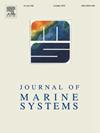是沿岸风异常还是赤道风异常驱动了印度洋偶极子?
IF 2.5
3区 地球科学
Q2 GEOSCIENCES, MULTIDISCIPLINARY
引用次数: 0
摘要
根据第一科学原理,这项研究表明,赤道风和沿岸风异常都会影响东南热带印度洋(SETIO)印度洋偶极子(IOD)正相的发展。虽然东南风有利于苏门答腊岛西南沿岸的上升流,但由于由此产生的开尔文波会增强或抑制苏门答腊岛的上升流,因此带状赤道风异常是控制印度洋偶极子变化的主要因素。以前的许多研究都认为,东南印度洋海域的赤道东风异常是触发比克尼斯正反馈的关键,从而导致正IOD(pIOD)事件的发生。在此,我们以 2019 年特别强烈的 pIOD 事件为重点,说明 pIOD 事件也可以在没有带状赤道风异常的情况下发生。因此,沿赤道的谢尔克斯反馈在 IOD 变率中的作用可能比以前认为的要小。本文章由计算机程序翻译,如有差异,请以英文原文为准。
Do coastal or equatorial wind anomalies drive the Indian Ocean Dipole?
Based on first scientific principles, this study shows that both equatorial and coastal wind anomalies influence the development of positive phases of the Indian Ocean Dipole (IOD) in the south-east tropical Indian Ocean (SETIO). While southeasterly winds are favorable for upwelling along Sumatra's southwest coast, zonal equatorial wind anomalies are the main control of IOD variability given that the resultant Kelvin wave enhances or suppresses the Sumatran upwelling. Many previous studies have argued that easterly equatorial wind anomalies in the SETIO are essential for triggering the positive Bjerknes feedback, and thereby, the development of positive IOD (pIOD) events. With a focus on the particularly strong pIOD event of 2019, here we show that pIOD events can also evolve in the absence of zonal equatorial wind anomalies. Hence, it is possible that the Bjerknes feedback along the equator is less involved in IOD variability than previously thought.
求助全文
通过发布文献求助,成功后即可免费获取论文全文。
去求助
来源期刊

Journal of Marine Systems
地学-地球科学综合
CiteScore
6.20
自引率
3.60%
发文量
81
审稿时长
6 months
期刊介绍:
The Journal of Marine Systems provides a medium for interdisciplinary exchange between physical, chemical and biological oceanographers and marine geologists. The journal welcomes original research papers and review articles. Preference will be given to interdisciplinary approaches to marine systems.
 求助内容:
求助内容: 应助结果提醒方式:
应助结果提醒方式:


